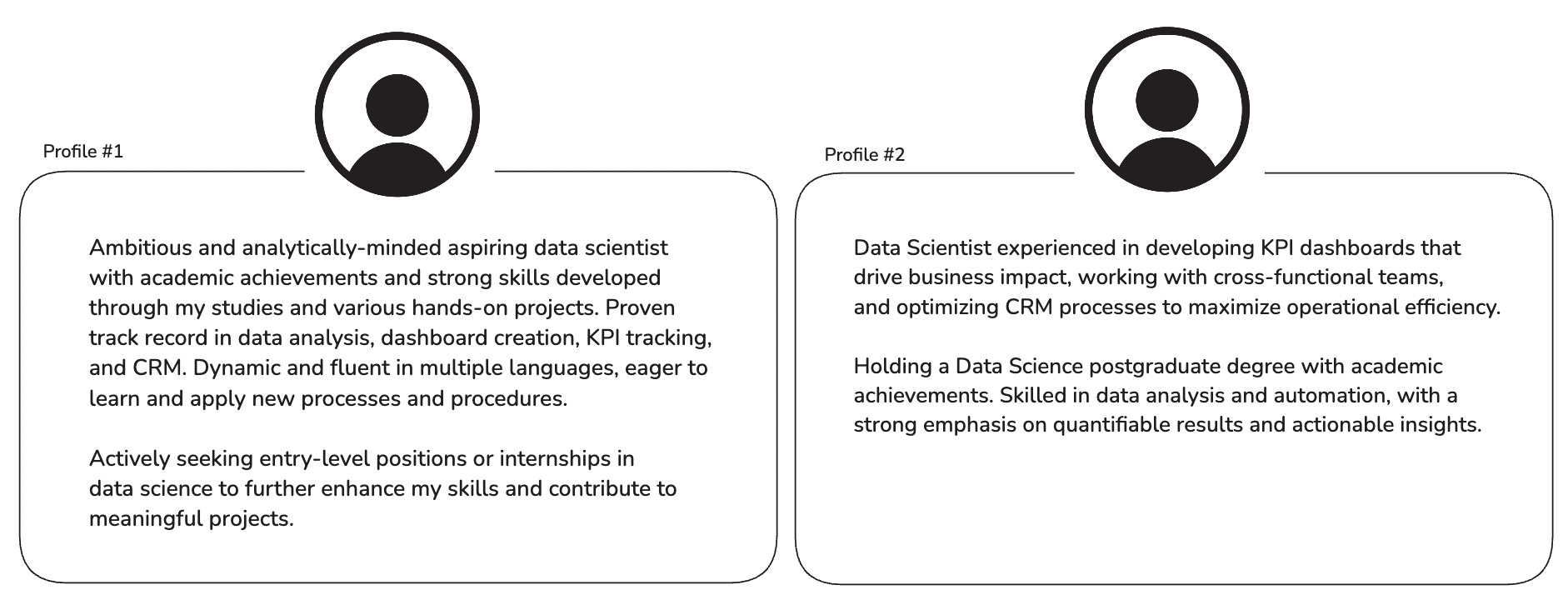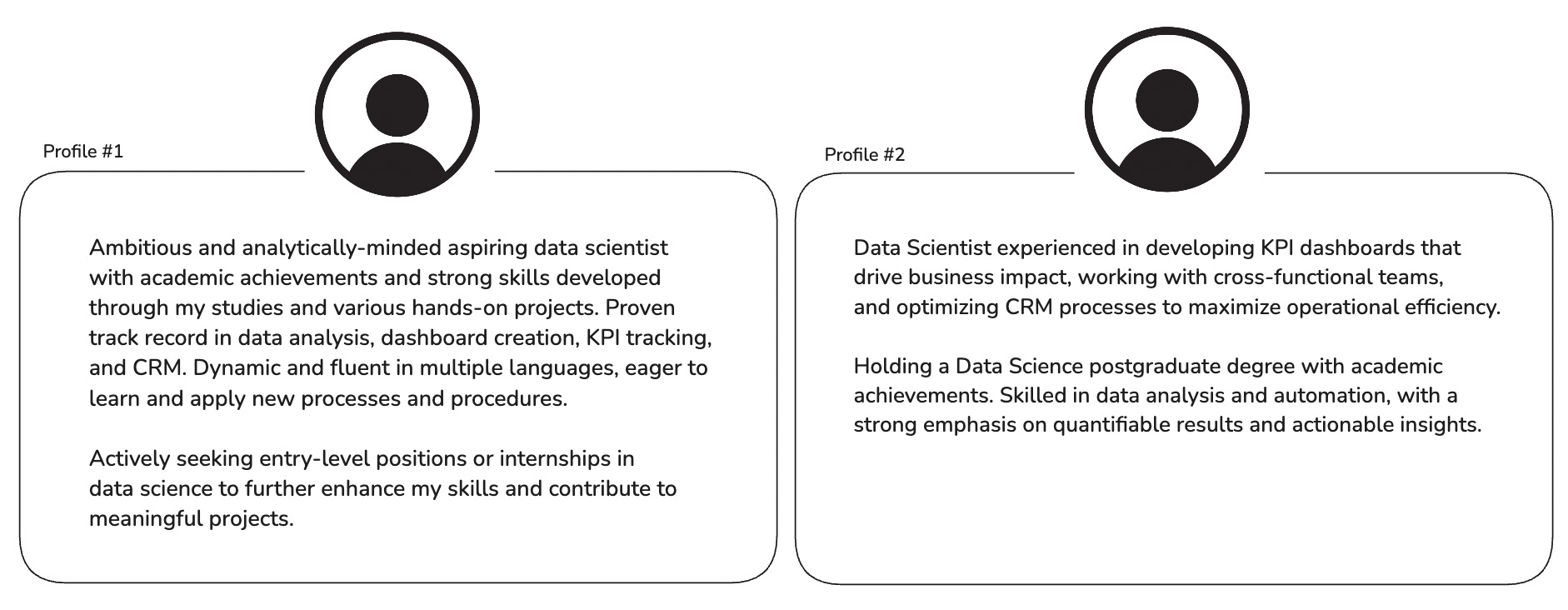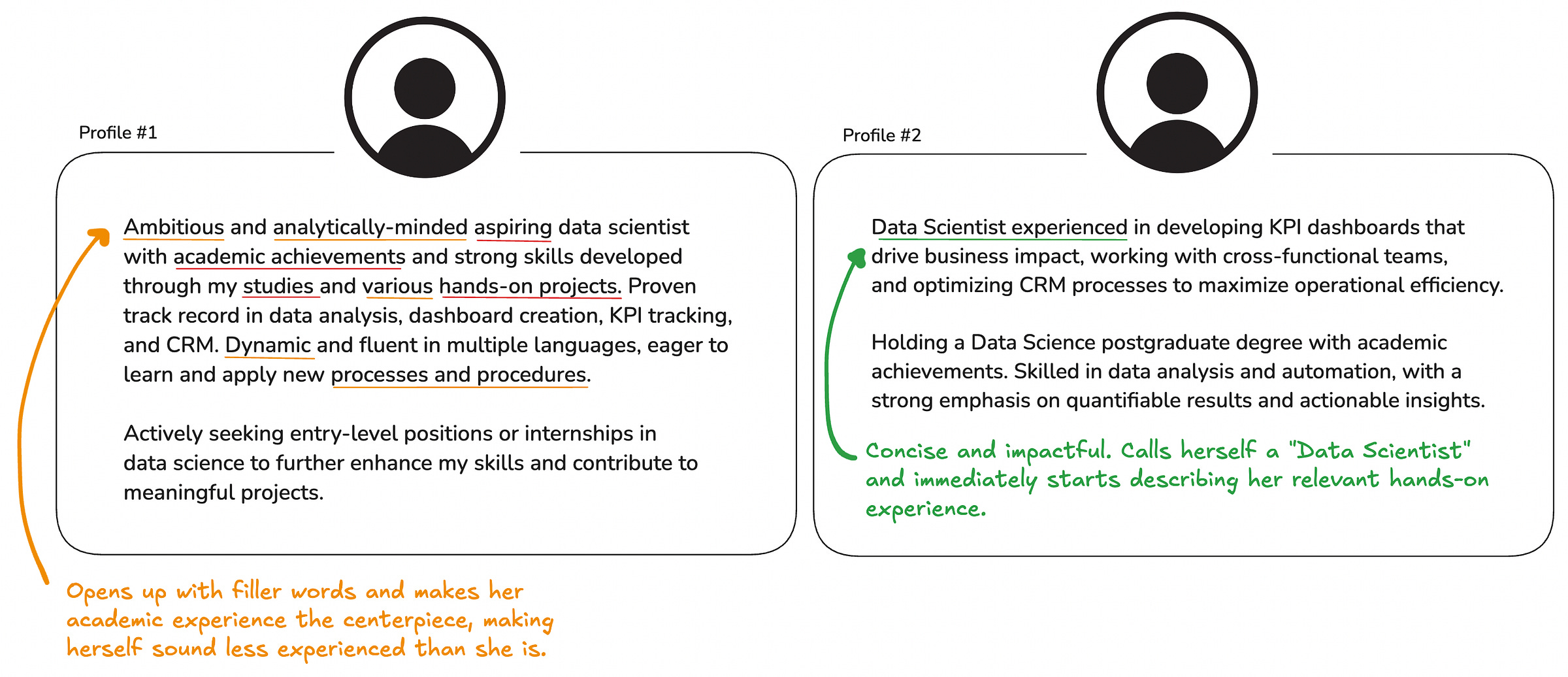How to Think and Act Like a Data Scientist to Land Your First Job
Ditch that student mindset to land your first job
This is a guest post by
from . Andres is a Sweden-based data scientist and writer, who’s mentored over 50 aspiring data scientist. I love reading about Andres’s insights from his hiring manager experience, as well as his multicultural background.
That’s what was missing! That’s what kickstarted my career!
I had this key realization during my last few months before graduation.
It all started with accepting that none of it mattered—not my capstone project, not the clubs I joined, and especially not my grades.
The day I graduated and stepped foot off campus once and for all, those experiences stopped being tangible and became memories that only I could fully understand.
It all meant nothing for my future career in data unless I found a way to tell my story in a compelling way.
Please indulge me for a minute:
🤔 Imagine you are responsible for growing a data team at a tech company.
This team plays a crucial role in supporting key stakeholders driving business growth.
So you decide to hire a new data scientist to help take things to the next level.
You post a job ad for a data scientist entry-level role and you are presented with these two profiles:
The question is: who do you interview?
You should know that both profiles belong to the same person—one of my mentees.
However, only “Profile #2” ticks a crucial box for the hiring manager.
Although my mentee had experience working as a Data Analyst, she had recently graduated with a Data Science postgrad, which meant she still saw herself as a student.
What allowed her to transform how she presents herself in a way that captures the attention of hiring managers?
A simple mindset shift.
Today, I want to help you move beyond the student mindset that's holding you back - by thinking and acting like a professional data scientist.
I’ll share the same advice that has helped many of my mentees—especially recent university and BootCamp graduates—transition from endlessly applying to jobs with few responses to start landing interviews.
This is what we will cover:
Embracing who you want to become: The psychology of perception
Controlling your narrative: Choosing your words more carefully
Walk in with confidence: Building it through experience
1 — Embracing who you want to become
Have you heard of the phrase Dress for success?
It comes from this idea that you should dress for the job you want, not for the job you have.
It’s all rooted in the psychology of perception. The way you present yourself—whether through your appearance, your resume, or your attitude—shapes not only how others see you, but also how you see yourself.
By aligning your actions and presentation with the role you aspire to, you begin to embody that role, even before you officially attain it.
And guess what? It all starts with your words.
2 — Controlling your narrative
Let’s go back to the scenario I painted for you earlier.
The question was, who do you interview?
There are many factors that play a role in answering this, but one of the key considerations hiring managers weigh when deciding who to interview is this:
Which candidate has the potential to create the most value in our company from the get-go?
Let’s go back to this example:
“Profile #1” is longer and embellished with lots of nice words such as “ambitious“ and “analytically-minded“.
At first thought, it might even feel counter-intuitive to think “Profile #2” would resonate better with hiring managers, but once again, it’s not about your school projects and academic achievements, it’s about the value you can provide to the company.
These are three principles you want to consider when telling your story, whether through your LinkedIn about section, your resume, or during an interview.
You are a Data Scientist: Stop calling yourself an “aspiring data scientist”, “recent graduate”, “data enthusiast”, or any other variation of those phrases that make you sound like an inexperienced student. Yes, You may be a recent graduate and you may be inexperienced, but you don’t have to reinforce that idea every time you talk about yourself.
Stay away from vague and generic words: Words like “hardworking” and “quick learner” are overused and don’t offer anything specific about you. Instead, replace them with clear, action-oriented language that highlights your skills and achievements. The more precise you are, the more you’ll stand out.
Focus on your relevant experience: Highlight the practical experience you’ve gained— through internships, projects, or freelance work. Emphasize the tools you’ve mastered and the problems you’ve solved, showing that you’re ready to make an impact from day one.
💡 Don’t make your academic experience the centerpiece of your story, unless you have a Master's degree or Ph.D. and the hiring manager is specifically looking for that. Even then, focus on what you’ve achieved without overusing "academic jargon", which can make you seem less experienced to potential employers
3 — Walk in with confidence
Confidence isn’t something you decide to have—it’s something you build through experience.
By working directly with data, solving real business problems, and seeing the tangible impact of your efforts, you start to carry yourself differently.
This confidence isn’t about pretending to be someone you’re not, it’s about knowing you’ve put in the work and can deliver results.
Here’s what I advise my mentees on building confidence:
Do mock interviews. This helps you get comfortable with the types of questions you’ll face and allows you to practice presenting your skills and experience effectively.
Ask for feedback from a mentor or someone more experienced. Honest feedback can highlight areas of improvement and reinforce your strengths.
Dedicate time to building a strong data science portfolio. A well-crafted portfolio showcases your hands-on experience and problem-solving abilities, which naturally boosts your confidence.
When you walk into a room with that kind of confidence, it’s impossible for hiring managers not to take notice.
Key Takeaways
As you transition from academia to the professional world, it’s crucial to shift your mindset to align with what hiring managers are looking for in a data scientist.
Ditch the student mindset: Many aspiring data scientists struggle to secure interviews because they continue to present themselves as students rather than professionals.
Speak like a professional: The language you use to describe your accomplishments should reflect confidence and clarity, showcasing your ability to deliver real value.
Confidence is key: Being humble is important, but it doesn’t mean underselling yourself. Confidence comes from leveraging your experiences and actively putting yourself out there which is critical in making a strong impression.
Your mindset shift is the bridge between where you are and where you want to be—embrace it, and the opportunities will follow.
PS: Want to land a top data jobs in just a few months, while adding $20-50K to your salary?
Join this list to get the details and be the first to know when spots open!








Helpful information, Mandy. I have shared your article in my knowledge base:
https://docs.teckedin.info/docs/curated-blogs-data-analytics-security
Great article. These ideas are true about so much in life. Want to be a healthy person, start making healthy choices. Want to be a morning person, set your alarm earlier. Want to be successful, start behaving like a successful person would. It's not "faking it till you make it", it's just "doing and then being".